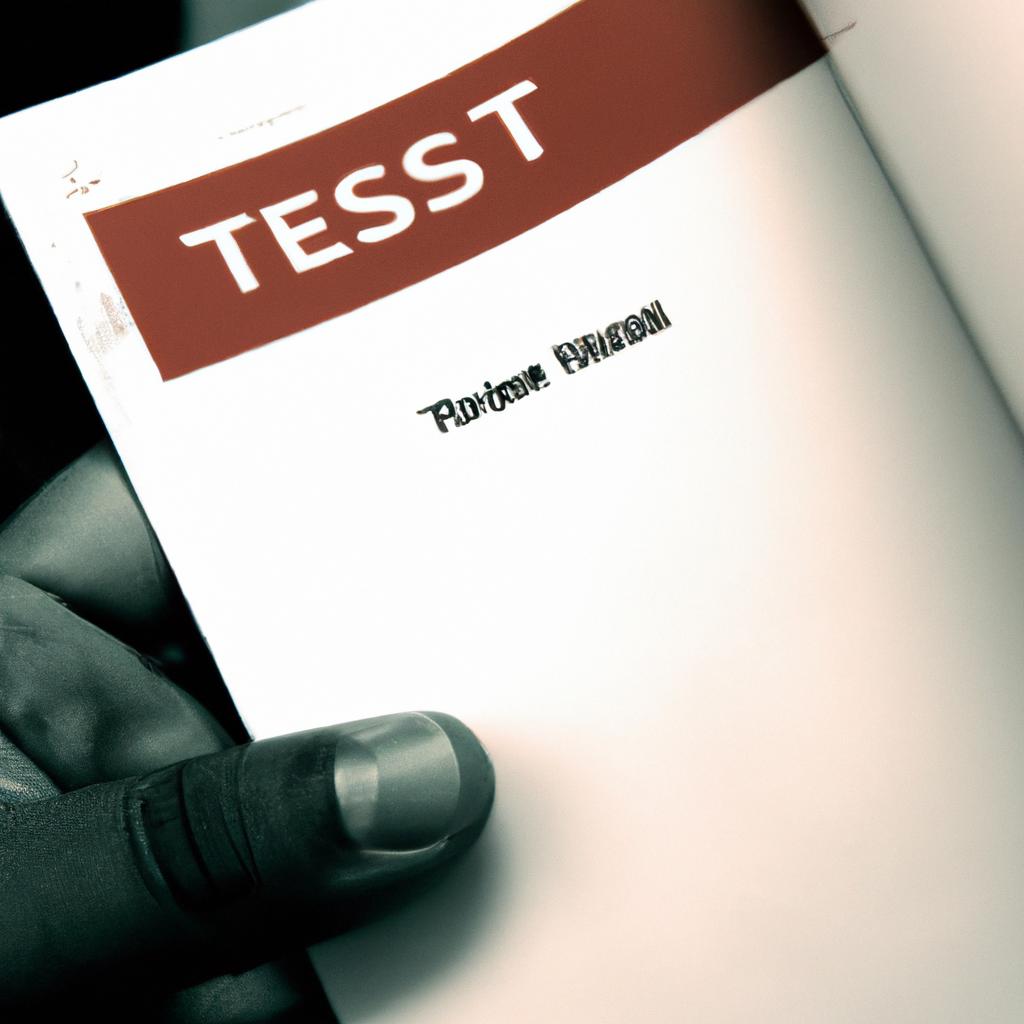Special education services play a vital role in ensuring that students with disabilities receive the necessary support and accommodations to thrive academically. In Knox County, these services are designed to provide quality education for all students, regardless of their individual needs. For instance, consider the case of Sarah, a hypothetical student with autism spectrum disorder (ASD) who requires specialized instruction and assistance in order to fully access the curriculum. Through the implementation of evidence-based practices and individualized educational plans, Knox County’s special education programs aim to address the unique learning requirements of students like Sarah.
In recent years, there has been an increased emphasis on inclusive education within special education services in Knox County. This approach recognizes the importance of fostering an inclusive school environment where every student is valued and provided equal opportunities for growth and success. By promoting collaboration among educators, parents, and related service providers, Knox County aims to create a supportive network that addresses not only academic goals but also social-emotional development for students receiving special education services. The commitment towards providing quality education for all is evident through various initiatives such as professional development programs for teachers, accessibility modifications in school facilities, and targeted interventions tailored to meet each student’s specific needs.
Overview of Special Education Services
Overview of Special Education Services
Imagine a young student named Emily who has been diagnosed with autism spectrum disorder. Despite her challenges, Emily possesses immense potential and deserves an equal opportunity to learn and thrive in the academic environment. In Knox County, special education services are available to students like Emily, ensuring that they receive the support necessary for their educational journey.
The provision of quality special education services is crucial in empowering individuals with disabilities to reach their full potential. These services strive to address the diverse needs of students, including those with learning disabilities, physical impairments, communication disorders, or emotional disturbances. By tailoring interventions and instructional strategies to meet individual requirements, educators facilitate meaningful learning experiences for each student.
To truly grasp the impact of special education services in Knox County, let us consider some key aspects:
- Inclusion: Students enrolled in special education programs benefit from inclusive classroom settings where they interact and learn alongside their typically developing peers.
- Individualized Education Programs (IEPs): Each student eligible for special education is provided with an Individualized Education Program tailored specifically to their unique strengths and weaknesses.
- Supportive Services: A wide range of specialized supports such as speech therapy, occupational therapy, assistive technology devices, and behavior intervention plans are offered based on individual needs.
- Collaborative Approach: Parents and guardians play an integral role in decision-making processes regarding their child’s education by actively participating in IEP meetings and advocating for appropriate accommodations.
This concerted effort toward creating inclusive environments not only benefits students but also fosters empathy among all members of society towards individuals with disabilities. The table below highlights the positive outcomes associated with implementing effective special education programs:
| Positive Outcomes |
|---|
| Improved academic performance |
As we delve further into this discussion about Knox County’s special education services, it becomes evident that ensuring the legal rights and responsibilities of students with disabilities is a crucial step in providing quality education. By understanding these rights, both educators and parents can work together to create an inclusive educational environment that promotes growth and success for all students.
[Transition into subsequent section about “Legal Rights and Responsibilities”] With this foundation in mind, let us now explore the legal framework surrounding special education services in Knox County and how it supports equal access to education for every student.Legal Rights and Responsibilities
Transitioning from the previous section, which provided an overview of special education services in Knox County, it is important to further explore the legal rights and responsibilities involved. To illustrate the significance of these rights and responsibilities, consider a hypothetical scenario where a student with a learning disability faces challenges within their educational journey. This case study will help shed light on how legal protections can ensure equal opportunities for students with disabilities.
Imagine a young student named Alex who has been diagnosed with dyslexia—a reading disorder that affects their ability to decode words accurately. Despite having average intelligence and showing potential in other areas, Alex struggles with reading comprehension and written expression. In this situation, it becomes crucial to understand the legal framework that protects individuals like Alex and ensures they receive appropriate support through various special education services.
To better comprehend the intricacies of these legal rights and responsibilities, let us examine some key aspects:
-
Individualized Education Program (IEP): The IEP is a legally binding document developed collaboratively by educators, parents or guardians, and any additional professionals involved in supporting the student’s needs. It outlines specific goals, accommodations, modifications, and related services tailored to meet the unique requirements of each student.
-
Free Appropriate Public Education (FAPE): FAPE guarantees that all eligible students with disabilities have access to an education that is tailored to their individual needs at no cost to them or their families. This includes specialized instruction as well as necessary aids and supports required for meaningful academic progress.
-
Least Restrictive Environment (LRE): LRE emphasizes inclusion, ensuring that students with disabilities are educated alongside their non-disabled peers to the maximum extent possible while still receiving appropriate support based on their individualized needs.
-
Procedural Safeguards: These safeguards provide mechanisms for resolving disagreements between parents or guardians and school districts regarding the identification, evaluation, or placement of a child with a disability. They include processes such as due process hearings, mediation, and formal complaint filing.
By recognizing and upholding these legal rights and responsibilities, Knox County’s special education services strive to create an inclusive environment where all students can thrive academically, socially, and emotionally. In the subsequent section on “Assessment and Individualized Education Programs,” we will delve into the crucial steps involved in identifying a student’s needs and developing an appropriate educational plan tailored to their specific requirements.
Assessment and Individualized Education Programs
Transitioning from the previous section on legal rights and responsibilities, it is crucial to understand that these rights serve as a foundation for ensuring quality special education services in Knox County. By recognizing and upholding their legal obligations, the educational system can effectively assess students’ needs and develop individualized education programs (IEPs) tailored to meet those needs.
Consider Sarah, a 10-year-old student with dyslexia who struggles with reading comprehension. With appropriate supports and accommodations outlined in her IEP, Sarah has made significant progress academically. This example highlights the importance of providing specialized instruction and necessary resources to empower students like Sarah to reach their full potential.
To further illustrate the impact of quality special education services, let us explore four key elements integral to fostering an inclusive learning environment:
- Collaboration: Effective collaboration between educators, parents/guardians, and other professionals ensures comprehensive support for students with disabilities.
- Differentiated Instruction: Tailoring teaching methods to accommodate diverse learning styles promotes engagement and academic growth among all learners.
- Assistive Technology: Incorporating assistive technology tools such as text-to-speech software or graphic organizers enhances accessibility and enables independent learning for students with disabilities.
- Social-Emotional Support: Providing social-emotional support through counseling services or peer mentoring fosters emotional well-being while promoting positive relationships within the school community.
These essential components work together harmoniously towards meeting the unique needs of each student receiving special education services in Knox County schools.
| Element | Benefits | Impact |
|---|---|---|
| Collaboration | Enhanced communication | Holistic approach |
| Differentiated Instruction | Individualized learning experience | Increased student achievement |
| Assistive Technology | Improved access & independence | Empowerment |
| Social-Emotional Support | Emotional well-being | Positive school climate |
As we move forward into exploring inclusive classroom practices, it is important to recognize that the provision of quality special education services relies on a collaborative effort involving educators, parents/guardians, and other professionals. By focusing on collaboration, differentiated instruction, assistive technology integration, and social-emotional support, we can create an educational environment where every student has equal opportunities to succeed.
Next section: Inclusive Classroom Practices
Inclusive Classroom Practices
Assessment and Individualized Education Programs play a crucial role in ensuring that students with disabilities receive the appropriate support they need to succeed academically. By identifying their unique strengths, weaknesses, and learning styles, educators can develop individualized education programs (IEPs) tailored to meet each student’s specific needs.
For instance, consider the case of Sarah, a 10-year-old girl diagnosed with dyslexia. Through comprehensive assessments conducted by special education professionals, it was determined that Sarah excelled in visual-spatial reasoning but struggled with reading comprehension. Armed with this knowledge, her IEP team crafted an educational plan that emphasized multisensory approaches to reading instruction while capitalizing on her strong visual skills. This personalized approach empowered Sarah to make significant progress in her reading abilities over time.
To ensure effective implementation of assessment-driven IEPs, Knox County Special Education Services employs various inclusive classroom practices. These practices aim to create an environment where all students feel supported and included alongside their peers without disabilities. Here are some examples:
- Differentiated Instruction: Teachers employ diverse teaching methods and materials to cater to different learning styles and abilities within the classroom.
- Universal Design for Learning (UDL): UDL principles guide instructional design by providing multiple means of representation, action and expression, and engagement to accommodate varying learner preferences.
- Collaborative Learning: Students work together in small groups or pairs to enhance peer-to-peer learning opportunities while fostering social interaction.
- Assistive Technology Integration: The use of tools such as text-to-speech software or alternative input devices enables students with disabilities to access curriculum content more effectively.
The following table illustrates how these inclusive practices benefit both students with disabilities and their typically developing peers:
| Inclusive Classroom Practices | Benefits for Students |
|---|---|
| Differentiated Instruction | – Enhanced understanding through personalized instruction- Increased engagement due to relevance- Improved retention of information |
| Universal Design for Learning | – Increased accessibility for students with diverse learning needs- Promotes independence and self-advocacy skills- Encourages engagement and motivation |
| Collaborative Learning | – Improves socialization skills among all students- Enhances communication and teamwork abilities- Fosters a sense of belonging and acceptance |
| Assistive Technology Integration | – Facilitates access to curriculum content for students with disabilities- Supports independent learning and participation- Empowers students to overcome barriers |
By leveraging these inclusive classroom practices, Knox County Special Education Services ensures that every student is given the opportunity to reach their full potential. In doing so, they create an educational environment where diversity is celebrated, fostering positive academic and social outcomes for all learners.
Transitioning into the next section on “Support Services for Students with Disabilities,” it becomes clear that assessment-driven IEPs and inclusive classroom practices are just the first steps in providing quality education to students with disabilities. To further support their individual needs, additional services are made available to ensure holistic development.
Support Services for Students with Disabilities
Building upon the inclusive classroom practices, Knox County provides a wide range of support services to ensure that students with disabilities receive the necessary assistance and accommodations to thrive academically. By tailoring interventions to meet individual needs, these specialized services create an environment where all students can succeed.
To illustrate the impact of these support services, let’s consider a hypothetical case study. Sarah is a fifth-grade student diagnosed with dyslexia. Despite her intelligence and motivation, she struggles with reading comprehension and written expression. With the implementation of appropriate support services, such as personalized instruction from a special education teacher, assistive technology tools tailored to her needs, and frequent progress monitoring, Sarah experiences significant improvement in her academic performance. By addressing her specific learning challenges through targeted interventions like multisensory teaching methods and text-to-speech software, Sarah gains confidence and achieves greater success in both language arts and other subject areas.
The commitment to providing quality education for all students extends beyond individual cases like Sarah’s. Knox County offers a comprehensive array of support services to address various disabilities, enabling every student to reach their full potential. These services include:
- Individualized Education Programs (IEPs) that outline specific goals and accommodations for each student.
- Accessible instructional materials such as braille textbooks or large-print materials.
- Speech therapy sessions conducted by certified speech-language pathologists.
- Occupational therapy programs focusing on fine motor skills development.
These resources are essential in fostering an inclusive educational experience for students with disabilities throughout Knox County schools.
Table: Impact of Support Services on Student Outcomes
| Support Service | Outcome |
|---|---|
| Personalized Instruction | Improved academic performance |
| Assistive Technology Tools | Enhanced accessibility |
| Progress Monitoring | Targeted intervention |
By offering diverse support services catered towards individual needs, Knox County ensures that every student has access to the tools and resources they require to succeed academically. This commitment is further strengthened through collaboration between parents and educators, as we will explore in the subsequent section.
Recognizing the importance of partnership between parents and educators, Knox County actively promotes collaborative efforts to enhance student learning and well-being.
Collaboration between Parents and Educators
Building on the importance of support services for students with disabilities, it is crucial to highlight how collaboration between parents and educators further enhances the quality of special education in Knox County. By working together towards a common goal, both parties can ensure that every student receives the necessary resources and assistance to thrive academically.
Case study: To illustrate this collaborative effort, let us consider the hypothetical case of Sarah, a fifth-grade student diagnosed with dyslexia. Sarah’s parents have been actively involved in her educational journey since her diagnosis. They regularly meet with Sarah’s teachers, attend Individualized Education Program (IEP) meetings, and communicate openly about their concerns and goals for their daughter’s academic progress. As a result of this ongoing collaboration, Sarah has access to specialized reading interventions tailored to her learning needs, additional time for assignments and assessments when required, and assistive technology tools that facilitate comprehension.
- Enhanced communication channels foster understanding and trust
- Shared decision-making ensures all stakeholders contribute to the child’s success
- Consistent monitoring allows for prompt intervention if challenges arise
- Cultivation of supportive relationships promotes a positive school environment
Furthermore, the effectiveness of parental involvement can be visualized through the following three-column table:
| Benefits for Parents | Benefits for Educators | Benefits for Students |
|---|---|---|
| Active participation in their child’s education | Access to valuable insights from experienced professionals | Improved academic outcomes |
| Strengthened advocacy skills | Increased job satisfaction | Enhanced self-confidence |
| Sense of empowerment | Greater awareness of individual student needs | Development of essential life skills |
In summary, by building strong partnerships between parents and educators within special education settings like those found in Knox County, students with disabilities can receive a higher level of support and achieve their full potential. This collaboration ensures that each student’s unique needs are identified and met through tailored interventions, fostering an inclusive educational environment where every child can succeed.
 Knox Democrats
Knox Democrats



